A distinguished panel of experts gathered Saturday at the Philoctetes Center for the Multidisciplinary Study of Imagination for a standing room-only roundtable on the many ways Facebook is changing how we live. The moderator was David Kirkpatrick, author of the soon-to-be-published The Facebook Effect: The Inside Story of the Company That is Connecting the World, and panelists included Sean Parker, co-founder of Napster, Plaxo, and Facebook, Nicole Ellison, co-author of the article The Benefits of Facebook Friends, and as well as Andrew Rasiej, founder of the Personal Democracy Forum.
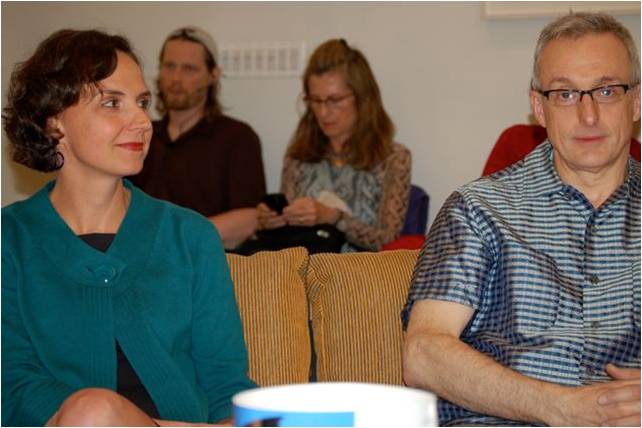
A distinguished panel of experts recently gathered at the Philoctetes Center for the
Multidisciplinary Study of Imagination of the New York Psychoanalytic Institute.
Facebook is more than a "social network," the panelists agreed. It is a parallel universe of relationships and social life, which for many of its nearly 500 million users has become a field of action nearly as significant as their real-world interactions. The average American user spends more than seven hours per month on Facebook, and increasingly uses it as a primary tool for communication. Facebook and other social media occupy a larger and larger portion of the time people spend online, becoming massively potent forces of change whose impact we are only beginning to comprehend. I personally have my Facebook open 18 hours a day with just under 5,000 'friends,' with another set of followers on Twitter, LinkedIn, Plaxo, and use Skype to communicate globally. Not to mention the elite social network we agree not to mention.
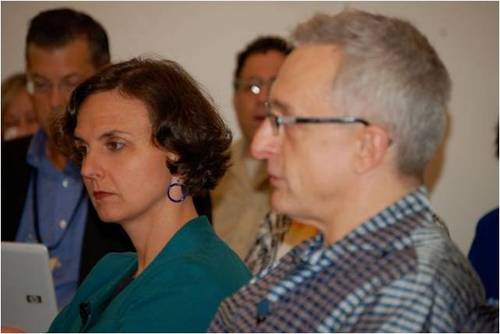
Nicole Ellison is a professor at Michigan State University and co-author
of the article The Benefits of Facebook Friends.
Some of the topics explored by the panel include: How does the new world of digital "friendship" affect our social life in the real world? How are we ourselves changing as we increasingly inhabit yet another virtual universe? What does the growing penetration of Facebook and social media portend for the way life will be lived, and how will it affect how we organize ourselves, from family life to politics? One of the primary architects of Facebook joins experts on individual empowerment and others to elucidate the impact of this looming presence in modern life.
Nicole Ellison is a professor in the Department of Telecommunication, Information Studies and Media at Michigan State University. She has published extensively on the social impacts of social network sites such as Facebook. Her co-authored article, The Benefits of Facebook Friends, uses a social capital framework to explore social capital outcomes of Facebook use by undergraduate students. She co-edited one of the first academic collections to focus on social network sites with danah boyd in 2007 and, as part of the collection, co-authored a well-received overview of social network sites. Her other research explores self-presentation in online dating contexts and the ways in which individuals use social network sites to receive social support and information from their social networks.
Nicole impressed me as a balanced advocate of Connectivity, and I spoke with her after the Roundtable and then by e-mail about the ways in which social media such as Facebook might help individuals accrue and maintain social capital.
Our research at MSU has examined how students and others use Facebook and the outcomes of their use. Social capital gives us a conceptual framework for measuring the benefits we receive from our social relationships.
We believe that Facebook and other social network sites lower the barriers for communication, thus enabling individuals to do things like give and receive social support to their Facebook Friends without the heavier transaction costs associated with face-to-face communication or traditional media.
Our more recent research examines the use of social media for information-searching, advice-seeking and discovering online resources such as news stories. Facebook, for many people, is essentially functioning as a filter that helps them determine what to pay attention to and what to ignore.
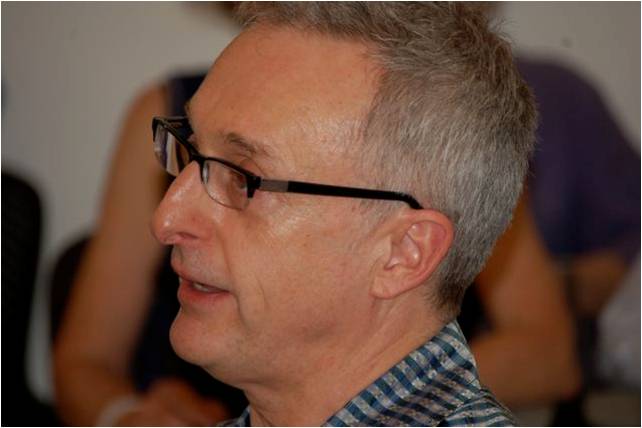
David Kirkpatrick wrote the definitive book on Facebook, The Facebook Effect: The Inside Story
of the Company That is Connecting the World, to be published by Simon & Schuster this June.
David Kirkpatrick (moderator) is the author of the definitive book on Facebook, The Facebook Effect: The Inside Story of the Company That is Connecting the World, to be published June 15 by Simon & Schuster (pre-order here). He was for many years senior editor for internet and technology at Fortune magazine, which he joined in 1983. He specialized in the computer and technology industries, as well as in the impact of the Internet on business and society. Kirkpatrick created Fortune's Brainstorm brand, beginning with a 2001 conference in Aspen that ran for five years. With a group of former Fortune colleagues, he is currently organizing a conference and media company called Techonomy, focusing on the centrality of technology innovation for all spheres of human activity.
David is incredibly knowledgeable about Facebook. I am particularly excited about the release of his new book, which I will review here. I spoke with him after the Roundtable and later by e-mail to me about his conviction that Facebook represents a fundamentally new form of communication. David said that the panel could only scratch the surface of the many ways that Facebook is changing our offline lives and how we think and feel. Much research will be required to understand the many subtle impacts that being so connected all the time with our friends is having on us. Look for him at The Techonomy Conference, August 4-6, 2010, at the Ritz-Carlton Highlands, Lake Tahoe.
Sean Parker is an entrepreneur who has helped create new ways of spreading information online. His first major product was Napster, which he co-founded at age 19, and which influenced the way people think about and share music. Two years later, Parker co-founded Plaxo, pioneering viral technologies that allow users to easily update contact information and stay in touch with colleagues. He served as Plaxo's president until 2004, when he joined with Mark Zuckerberg to develop Facebook.
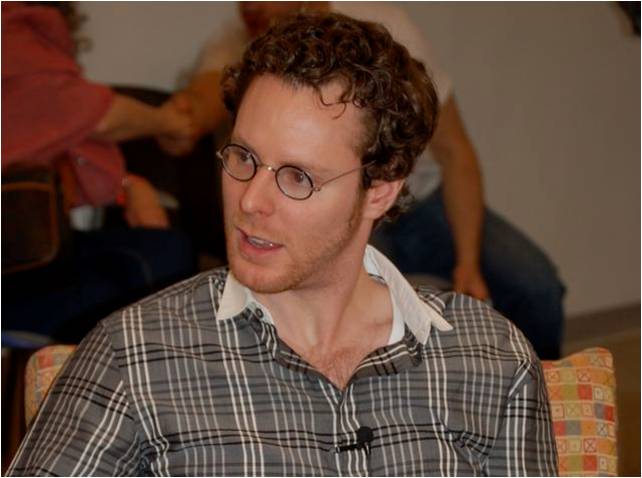
Entrepreneur Sean Parker helped create Napster, Plaxo, and the biggest of all, Facebook.
Sean was Facebook's founding president, guiding the company's early growth and formulating strategies that helped it become the world's most popular social networking site. His latest company is (Facebook) Causes, which he co-founded in 2007, and which has become the largest online platform for grassroots activism and philanthropy, and the most popular non-game application on Facebook. In addition to founding and leading emerging companies directly, Parker is a managing partner at Founders Fund, a venture capital firm that has backed companies including Facebook, SpaceX (the company NASA hired to resupply the International Space Station), Quantcast, and Mint.
I spoke with Sean after the presentation. He is a God of Connectivity, dressed more like my son than a millionaire. He could not have been more grounded.
Andrew Rasiej is the Founder of Personal Democracy Forum, an annual conference and website covering the intersection of politics and technology. He is also the co-founder of techPresident, a group blog that covered how the 2008 presidential candidates were using the web, and how voter generated content, a term he coined, affected the campaign. In the 2004 Presidential race he served as chair of the Howard Dean Technology Advisory Council, and in 2005 he ran a highly visible campaign for Public Advocate of New York City, running in the Democratic primary on a platform to bring low cost wireless Internet access to all New Yorkers.
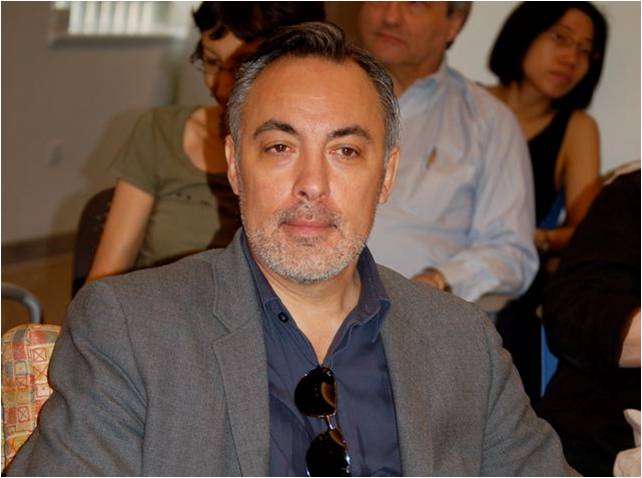
As founder of the Personal Democracy Forum, Andrew Rasiej knows social media.
Andrew appears as an expert on the Internet and politics on major media channels. He has served as an advisor to members of Congress and political candidates on the use of Information Technology for campaign and policy purposes since 1999 and is also Senior Advisor to The Sunlight Foundation. In 1997 he founded MOUSE.org which helps train public school students how to fix and maintain computers and networks in their schools.
Dr. Dhiraj Murthy is Assistant Professor of Sociology at Bowdoin College in Maine. He teaches a course on social media called "In the Facebook Age," a class where students navigate larger sociological themes surrounding the social, political and economic implications of social networking sites. He has published on the use of social networking sites by subcultures and on digital research methods. His article, Digital Ethnography: An Examination of the Use of New technologies for Social Research (LINK) critically assesses the ways in which social researchers can conduct research on social networking sites, including Facebook. He is currently writing a full-length book focused on Twitter, titled Social Communication in the Twitter Age.
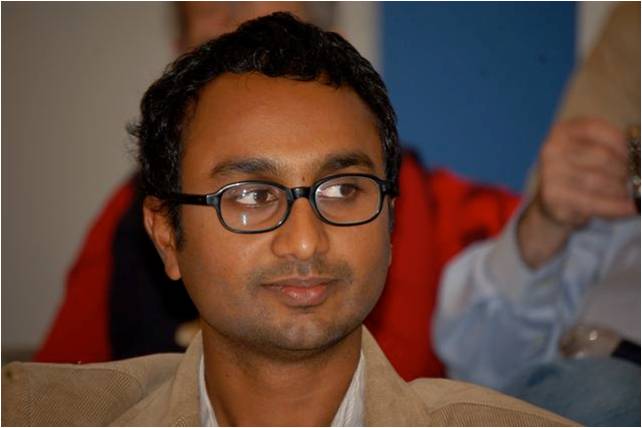
Dr. Dhiraj Murthy is Assistant Professor of Sociology at Bowdoin College in Maine.
19. Use Social Media. Facebook, Twitter and Linkedin are where it's at. These connections are not your true friends, they are your "Facebook friends." They will not help you pay your rent. They might not even contribute. But from them will emerge your most trusted inner circle.
30. Life in a Bubble. Forget having a personal life. From the day you commit to leadership, you need every e-mail, every Twitter, every Facebook posting to hold up to New York Times scrutiny. Be prepared for the world to know everything about you. If privacy is a problem, don't be a leader.
Just because social media is new does not mean it is not real. When it was first introduced, the telephone was considered "artificial," but today any call phone conversation is considered 'real.'
It was an amazing experience for me to sit in on such an important conversation with Nicole Ellison, David Kirkpatrick, Sean Parker, Andrew Rasiej, and Bard professor Dhiraj Murthy. I was tremendously impressed that the Philoctetes Center convened such a distinguished group of Thought Leaders and Global Citizens on New York's Upper East Side. Each and every presenter is actively engaged in Connecting Goodness.
Events at Philoctetes are free and open to the public. The Philoctetes Center for the Multidisciplinary Study of the Imagination was established to promote an interdisciplinary approach to the understanding of creativity and the imaginative process. To achieve its mission, the Center organizes roundtable discussions and music, poetry, and film series. All programs are free and open to the public. The Philoctetes Center is located at 247 East 82nd Street; tel. 646-422-0544; info@philoctetes.org.
All photos courtesy of the Philoctetes Center.
